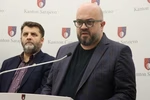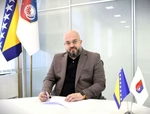
The US State Department special envoy on electoral reform in Bosnia and Herzegovina, Matthew Palmer, said the electoral law issue should be resolved by removing "ethnic prefixes" in the election of members of the country's Presidency and members of the upper house of the parliament of the Bosniak-Croat Federation entity.
Oglas
We would be happy to see some limited targeted changes to the Constitution that would remove ethnic prefixes from the elections for the Presidency and the House of Peoples of the Federation, as well as reform of electoral legislation that would ensure greater transparency and accountability, Palmer said in a Bosnian-language interview with the Voice of America published on Tuesday.
He added that the United States would like to see Bosnia and Herzegovina have an electoral system that matches the fundamental compromises that were part of the Dayton Agreement, but also that allows Bosnia and Herzegovina to meet its obligations and responsibilities to the European Union.
This includes the settlement of certain judgments of the European Court of Human Rights, including the Sejdic-Finci case. The package that we advocate and that we are working on with politicians to move forward would achieve both: addressing the concerns of the European Court of Human Rights, the Sejdic-Finci case and other judgments of the European Court of Justice, but also promoting functionality and helping Bosnia and Herzegovina to move forward with Europe, Palmer said.
He avoided mentioning the ruling by the Constitutional Court of Bosnia and Herzegovina in the Ljubic case, which relates to the manner in which the House of Peoples is filled, on which the Croat HDZ BiH party insists.
When asked whether the US position includes the problem of “legitimate representation”, which HDZ BiH leader Dragan Covic is talking about, Palmer said he understood it as a request for a person representing the interests of Croats in Dayton structures to be elected by a majority of Croat voters.
We understand these concerns in the context of one country, two entities, and three constituent peoples, and we continue to believe that there is a way to resolve these concerns in accordance with the rulings of the European Court of Human Rights. This process of negotiating constitutional amendments and electoral reforms is part of resolving these concerns and enables Bosnia and Herzegovina to achieve a more functional and European system, Palmer said.
He noted that the responsibility for finding concrete solutions rests with politicians in Bosnia and Herzegovina and that the international community, including the US, remains ready to help but will not impose solutions.
It is important that the agreed solutions are defined in such a way that new legal disputes about their content are avoided, which means that any new form of discrimination in the electoral process must be avoided, he added.
The idea is to eliminate and reduce the level of discrimination in Bosnia and Herzegovina's political system to ensure that everyone has the opportunity not only to vote but also to run for any office, Palmer explained.
Kakvo je tvoje mišljenje o ovome?
Učestvuj u diskusiji ili pročitaj komentare
Oglas
Kakvo je tvoje mišljenje o ovome?
Učestvuj u diskusiji ili pročitaj komentare
Oglas





 Srbija
Srbija
 Hrvatska
Hrvatska
 Slovenija
Slovenija



























































